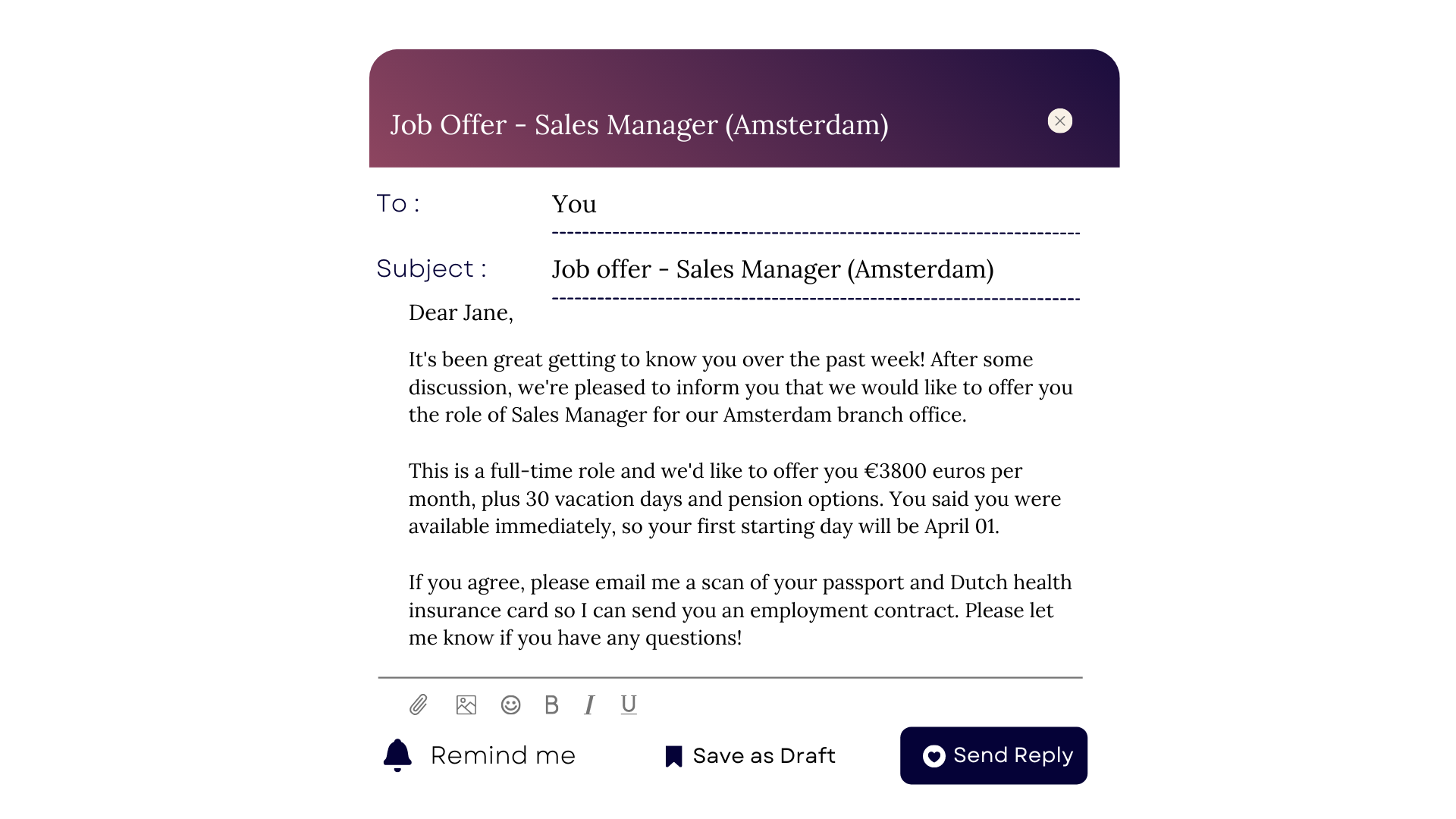
You are expecting to receive a job offer so you can work in the Netherlands. Congratulations on earning it! Searching for a job in an unfamiliar country can be challenging, but now that you’ve made it this far, you’re probably wondering what to expect when you receive a job offer in the Netherlands.
In this article, we’re going to look at a typical job offer from a Dutch employer. We will break down the communication in the image below, so you know what it means, and which questions to ask.

Salary
The amount you’ll be paid is what matters most – right? In the above example, Jane is offered €3800 euros per month. If you’re a salaried worker, you’ll find that most employers in the Netherlands communicate salaries per month (as opposed to yearly). If you are an hourly worker, then you will be told the amount you receive per hour.
Although we don’t know for sure, it’s fair to assume that this offer is gross (i.e.., before taxes), which is standard for communicating salaries in the Netherlands. Likewise, this is probably not the exact amount she’ll see in her bank account every month. Salary is taxed at different rates depending on the amount that you make. If Jane is making 3800 euros before taxes, she can expect around 3000 euros in her bank account every month.
This amount likely includes the Dutch holiday allowance (vakantiegeld), also known as the 13th month salary.
What should Jane ask the employer in this scenario?
- Clarify whether 3800 euros is gross or net
- If 3800 is not sufficient for Jane, this is the time to open negotiations
- Clarify additional benefits offered by the company that may have been advertised
- Don’t ask about how much you will receive after taxes. Ask this question after you’ve accepted the offer to the company’s payroll manager.
Starting date
Isn’t it strange that Jane indicated she was available immediately, but won’t start until the first of the month? Unless there’s real urgency from the employer, you can expect that your start date will fall on either first day (or Monday) of the upcoming month. The start date they offer is usually aligned with the company’s current payroll processes — which makes administration around your employment easier on their side.
It’s not inappropriate to request a different start date than the one that is offered, but keep in mind that it may not be possible for you to start earlier than the offered start date.
Contract duration
One particularly important fact this offer does not mention is the duration of the employment contract. In the Netherlands, it’s common to be offered a contract with a defined end date (also known as a fixed-term contract) before a contract with an undefined end date. There are very few legal reasons to dismiss an employee with an indefinite contract – which is why it is common to start with a defined end date before switching to an indefinite contract.
What can Jane ask the employer in this scenario?
- What is the duration of this contract?
- How long in to my employment will we revisit renewing my contract?
Paid time-off (PTO)
In the above email, Jane is offered 30 “vacation days”. This refers to paid time off (literally translated from the Dutch: vakantiedagen). It can be confusing for expats who are used to communicating paid time off in hours, so feel free to ask for this conversion to understand what you’re receiving. Important to know: The legal minimum number of paid days off your employer must offer is 20 days (not including public holidays, which are also paid days off).
What can Jane ask the employer in this scenario?
- How many hours of paid time off will I be allowed?
- Do the 30 days in your offer include public holidays?
Check out our resources for job seekers in the Netherlands
It is always exciting to be offered a new job opportunity as it comes with a new role and a fresh start. Once you’ve accepted the offer, make sure you evaluate the employment contract you receive. Visit our blog to read more tips and resources that will help you navigate finding a job in the Netherlands.
Octagon Professionals are experts in employment law in the Netherlands with 35 years of experience. We’re always looking for skilled people to introduce to our clients. If you’d like us to keep you in mind during your job search, upload your CV on our website.
more news

Explained: The NEW 30% ruling
12-04-24
If you were recruited from outside the Netherlands, you are likely familiar with the concept of the ‘30% ruling.’ In 2024, the Dutch government introduced several key changes to the 30% ruling. To help businesses and expats understand what these changes mean for them, we are going to use this article to explain the NEW 30% ruling.

Guide to wages in the Netherlands (updated 2024)
14-03-24
Wages in the Netherlands can baffle internationals regarding how it is calculated or how much tax is deducted from the “gross amount”. Not to mention, the minimum wage, social premiums, and extra benefits typical in the Netherlands is unique. We ...